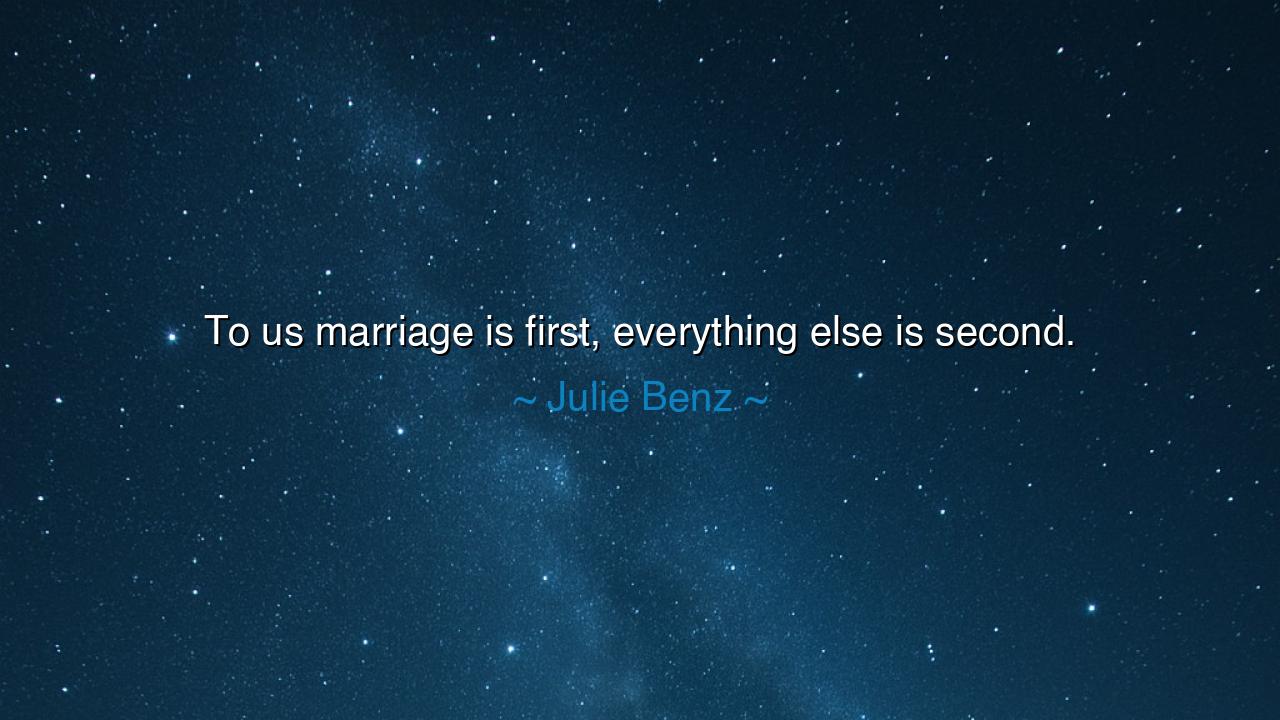
To us marriage is first, everything else is second.






In the vast and ancient tapestry of human relationships, marriage has long been considered the ultimate union—a sacred bond that transcends the individual, intertwining two souls in the pursuit of a shared life. The words of Julie Benz—"To us marriage is first, everything else is second"—speak to the very heart of this union, where all other concerns and pursuits pale in comparison to the sanctity and priority of the marriage itself. This powerful declaration speaks to a fundamental belief that in a world full of distractions, marriage should be the anchor, the foundation, the sacred commitment upon which everything else is built.
In the ancient world, the marriage bond was not just a personal relationship but a sacred covenant that held the fabric of society together. Consider the ancient Hebrews, whose marriage laws were grounded in the belief that the union between husband and wife was not merely a social contract but a divine ordinance. For them, marriage was not just a choice but a calling, and the fulfillment of this bond was seen as the highest form of human connection. In the same spirit, Benz’s words suggest that marriage—in its holistic sense—must come first, with all else following in its wake, like tributaries flowing into a mighty river.
The idea of marriage as the cornerstone of life is echoed throughout history. Take, for instance, the story of Cleopatra and Julius Caesar, whose union was more than just a political alliance—it was the foundation of their personal and public lives. Their marriage, while fraught with power struggles and intrigue, was a defining moment in both their lives, influencing not just their own destinies but the fate of Rome itself. For Cleopatra, her connection with Caesar was not just a tool for political gain, but the central force that shaped her actions, decisions, and legacy. In this, we see how marriage can serve as the guiding star, the nucleus around which all other pursuits revolve, whether personal or political.
Yet, even in the modern world, marriage continues to hold an undeniable centrality in the lives of many. Julie Benz's perspective invites us to reflect on how marriage provides both stability and purpose, a sense of shared responsibility that transcends the individual. In a world where personal success and career achievements often take precedence, her words are a reminder that true fulfillment comes not from external accomplishments, but from the strength of the relationship that lies at the heart of the family unit. Marriage, as Benz puts forth, must be the foundation upon which all other endeavors are balanced, for it is through the lens of a strong, committed relationship that one can face the trials and joys of life with a sense of unity and purpose.
Consider the story of Elizabeth Barrett Browning and Robert Browning, whose marriage was a union of intellectual and emotional depth, deeply influencing their work and legacies. Though both were accomplished poets in their own right, it was in their marriage that they found the most profound inspiration. Elizabeth’s health was fragile, yet she thrived in the nurturing love of Robert. Their bond not only sustained them through personal hardship but also sparked some of the most enduring poetry in the English language. Their marriage was not just a personal affair but the central force in their lives, a living testament to the truth that when marriage is prioritized, it can fuel all other creative and personal endeavors.
Benz’s assertion that marriage is first, and everything else second, also underscores a vital truth about human connection—that the deepest bonds are often those that are sustained through nurturing and prioritization. Just as Cleopatra and Julius Caesar were bound together in a powerful connection that shaped their actions, so too does the modern marriage demand the same level of commitment. Marriage, as Benz highlights, is the lifeblood of all other aspects of life. It must be tended to with care, protected from external forces that may seek to undermine it, and cherished above all else.
The lesson, then, is this: marriage is not a mere accessory to life—it is the very foundation upon which all else is built. Just as Socrates believed that the key to a harmonious society lay in the harmonious union of spirit and mind, so too is a successful marriage grounded in a balance of love, commitment, and shared vision. In your own life, ask yourself: Do you prioritize your closest relationships? Do you tend to them with the same energy and focus that you devote to your career or other pursuits? The true test of success is not measured by external achievements but by the strength and depth of the bonds that nourish your soul.
May we all strive to cultivate relationships that are not secondary to our ambitions, but the core that gives meaning to all else. Marriage, in all its beauty and challenge, offers the stability and purpose needed to navigate the complexities of life. In this, we find not just fulfillment, but a legacy of love and commitment that will endure through the ages. Just as Julie Benz highlights, when we place marriage first, we lay the groundwork for a life that is not only meaningful but deeply aligned with our truest selves.






AAdministratorAdministrator
Welcome, honored guests. Please leave a comment, we will respond soon